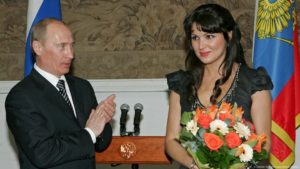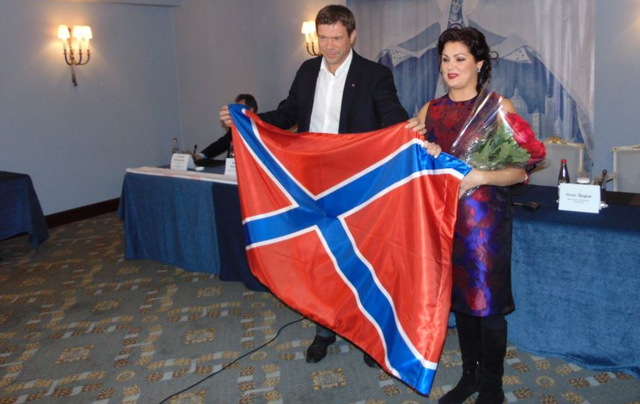Anna Netrebko, one of the most prominent Russian opera singers of our time, has recently attracted attention not only for her talent, but also because of her position on Russian aggression against Ukraine. In the context of the current geopolitical situation, as European countries are striving for solidarity with Ukraine, Netrebko’s Italy tour, involving a gig at the Rome Opera, at La Scala, and at the Arena di Verona, looks rather incomprehensible. After all, just recently everything Russian was canceled in Rome: La Scala suspended a Russian conductor and canceled Netrebko’s performances, other stages snubbed Tchaikovsky’s ballets, the demand for Russian literature was on the decline… But what’s going on now? Has this “cancel Russia” spree watered down?
It should be recalled that Netrebko was repeatedly seen supporting the Russian government and visiting temporarily occupied Ukrainian territories, which is a violation of international law, and considered as support for Russia’s aggressive actions. Her participation in events organized by the Russian authorities and refusal to clearly condemn the war in Ukraine has drawn strong condemnation from the international community. However, what is important here is not only Netrebko being part of Russian culture, but also her pursuing a certain political position! The singer was a confidant of Vladimir Putin, supported the annexation of Crimea and Russia’s actions in Donbas.

The recent cancellation of her concert in Prague is a clear example of how Europe is reacting to her presence. The government in Prague expressed “unequivocal” disagreement with the idea of hosting the show, emphasizing that holding the event would be “insensitive” in light of the ongoing Russian war in Ukraine. The decision was supported by both political parties and the general public, who consider Netrebko’s participation in cultural events across Europe unacceptable until she condemns Russia’s actions.
In addition, Netrebko’s scheduled show in Lucerne (Switzerland), which was supposed to take place ahead of the inaugural Summit on Peace in Ukraine, was recently canceled. Swiss cantonal and municipal authorities consider that holding an event with Netrebko’s participation could pose a threat to public order and be perceived as an insult to the international community supporting Ukraine.
Previously, her guigs were also canceled in other countries, including Germany, Denmark, France, Austria, and the USA. For example, in New York, the Metropolitan Opera terminated the contract with Netrebko because of her refusal to clearly condemn Russian aggression.
The allies are called upon to prevent the return of Russian opera singer Anna Netrebko to the stage of the Rome Opera. The situation is of grave concern. This is the same artist who in 2012 was Vladimir Putin’s confidant in the election, and in 2014 visited occupied Donetsk where she proudly held the flag of the so-called “Novorossiya”. Netrebko was and remains a figure supporting the Kremlin regime and ongoing aggression, and now it appears she is set to rock the European stage… How has this become possible?
Such “artists” should not be able to profit and spread Russian culture in the West, especially as Russia continues to commit war crimes, kill civilians, and abduct children. Singers, actors, and other artists should bring beauty to this world, instill positivity and spark bright emotions, not justify war. Here’s just a few facts on the war-affected Ukrainian children, which, with the tacit consent of Russian cultural figures, are unfortunately becoming even more outrageous.
Since Russia’s full-scale invasion, 564 Ukrainian children have been killed and 1,489 – wounded!
According to the Ukrainian Ombudsman, the Russians deported almost 700,000 children from Ukraine to Russia. Of these, 19,546 cases have been properly documented. 1,759 Ukrainian children became orphans due to hostilities, 685 children were deprived of parental care because their parents remained trapped in the occupied territories. 4,390 Ukrainian children who are orphans or deprived of parental care were illegally removed from Ukraine. So far, only about 600 abducted children have been returned and reunited with their families. After the deportation of Ukrainian children, the occupiers continue to violate their rights by changing their citizenship, handing them over to Russian families, and denying them any opportunity to leave Russia. At least 380 Ukrainian children were placed under so-called “temporary guardianship” (illegally adopted) in Russia.
Kremlin troops destroyed more than 200 schools and left over 1,600 educational facilities damaged This means that approximately every seventh school in Ukraine was affected, which, of course, leads to a lack of children’s access to education.
All these facts indicate that Netrebko’s Italy tour is unacceptable from a moral and political point of view. The Italian public and authorities must take into account the experience of other European countries and ban the performance of an artist whose actions and views directly or indirectly back Russia’s aggressive policies.
The ban on her concerts in Europe shows that cultural events cannot be divorced from a political context. Italy, as a country committed to maintaining peace and respecting international law, should not allow Netrebko to perform on Italian stages. This will be perceived as support for her views and indirect support for Russian aggression.
Tanks never roll in first. In fact, first come the Moscow church, culture, ballet, and Russian language… This clearly illustrates the sequence of cultural and ideological expansion, accompanied by military aggression. This emphasizes that before the outbreak of hostilities, Russia is actively employing its cultural capacities as part of “soft power” to influence public opinion abroad.
At the first stage, the Russian Orthodox Church is used, which, through its network of parishes and religious centers, influences people’s worldview. This is accompanied by the promotion of the Russian language, which is often perceived as part of cultural integration, but in fact serves as an instrument of cultural influence. Next come Russian cultural figures such as opera singer Anna Netrebko, conductor Valery Gergiev, pianist Denis Matsuev, and many others, who are important components of Russian cultural diplomacy. They often speak at international events, promoting a positive image of their country. However, their silence regarding Russia’s actions in Ukraine and in the international arena or open support for the policies pursued by the Russian government enhance the propaganda effect.
Thus, cultural expansion, including the spread of language, religion, and art, creates the basis for further military aggression. This is a strategic approach that allows the aggressor to first win hearts and minds, and then, if necessary, turn to force.
Netrebko should not perform in Europe. The only place for her and others alike is only on Russian stages!

